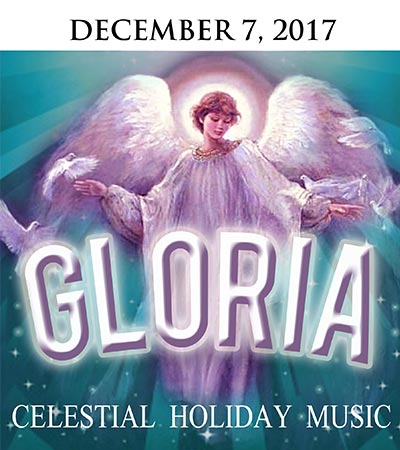Concert 2 “Gloria”
Celestial Holiday Music
Thursday, December 7, 2017 7:30 PM
Wine & Cheese Reception 6:30 pm
Cailloux Theater – Kerrville, Texas
PERFORMANCES INCLUDE
Christmas Festival – Leroy Anderson
Gloria – John Milford Rutter
Music from Handel’s Messiah – Georg Friedrich Händel
Polonaise from Christmas Eve Suite – Nikolai Rimsky-Korsakov
American Spiritual Festival – arr: Steven L. Rosenhaus
Hamabdil – Granville Bantock
Hava Nagilah – arr: Kreger
A Holly Jolly Sing-Along – James Stephenson
Conductor’s Letter
Dear Symphony of the Hills Friends,
At our first concert of the year, the Symphony of the Hills featured music inspired by the wildness and glory of the American frontier. Well, November, December, and January bring us opportunities to celebrate and give thanks for our many blessings in life. One such expression is found in that word “glory.” From the Latin gloria, the word indicates the expression of honor and magnificence.
The featured work on our second concert of the season is John Rutter’s magnificent work entitled “Gloria” for orchestra and chorus. This is one of Rutter’s most popular and beautiful works that celebrates the holiday season with expressions of joy and praise.
The symphony and chorus will also feature two of the most popular choruses from Handel’s Messiah, “And the glory of the Lord” and “Hallelujah.”
On the second half of the concert, the orchestra will ring in the season with Rimsky-Korsakov’s exciting Polonaise from his “Christmas Eve Suite.” Next, we know how African-American spirituals provide a deep influence on our faith, music, and celebration of the holidays. This music expresses “glory” in the emotional context of songs such as “Everytime I feel the spirit,” and “Sometimes I feel like a motherless child,” and also the energy of “Give me that old time religion.” And, the Jewish tradition brings us one of the most energetic and festive dances of the season, the Hava Nagilah. Finally, we invite our audience to join in on a Holly Jolly sing-a-long to end the glorious evening of music.
We hope to see you at the Kathleen C. Cailloux Theater on December 7!
In peace,
Gene Dowdy
Conductor & Artistic Director
Concert Notes
[sta_anchor id=”gloria-concert-notes” unsan=”gloria concert notes” /]Christmas Festival
Leroy Anderson (1908–1975)
Leroy Anderson was an American composer of short, light concert pieces, many of which were introduced by the Boston Pops Orchestra under the direction of Arthur Fiedler. Anderson was well educated in the musical arts, graduating with a BA Magna cum laude in 1929 from Harvard. In Harvard Grad School, he studied composition and received a Master of Arts in Music in 1930. Anderson continued at Harvard, working towards a Ph.D. in German and Scandinavian languages. He spoke English and Swedish during his youth and eventually became fluent in Danish, Norwegian, Icelandic, German, French, Italian, and Portuguese.
Somehow Anderson found time for music. He began his career in popular music composition in 1938, with some early success. He joined the Army in 1942 and in 1945 was assigned to the Pentagon as Chief of the Scandinavian Desk of Military Intelligence. During his military career, he continued to compose music, in which he was notably successful. John Williams described him as “one of the great American masters of light orchestral music.” His name and his music are very recognizable by those of us who grew up in the Fabulous Fifties. His “Blue Tango” was the first instrumental recording ever to sell one million copies.
In 1950 Anderson arranged a stirring arrangement of widely-recognized Christmas songs which he called A Christmas Festival. After he shortened the piece in 1952, it received nationwide publication.
He was posthumously inducted into the Songwriters Hall of Fame in 1988 and his music continues to be a staple of “pops” orchestra repertoires.
Gloria
John Milford Rutter (1945-)
Many Christmas carols, choral works, hymns and anthems have come from the creative mind of John Rutter, a prolific British composer whose compositions have become very popular in the U. S. His music is eclectic, showing the influences of 20th century French and English choral traditions. Although he is known primarily for composing and conducting religious music, Rutter told the US television program 60 Minutes in 2003 that he was not a particularly religious man. His music, however, is deeply spiritual and obviously inspired by the spirituality of sacred verses and prayers.
In 1981, Rutter founded his own choir, the Cambridge Singers, which he conducts and with which he has made many recordings of sacred choral repertoire, including his own works. Among the most popular pieces performed by the Cambridge Singers is “Gloria,” a “joy for your ears, mind and heart.” It has been said that Gloria will take your breath away, with the second movement, “Domine Deus, Rex caelestis,” a thrilling and majestic work. This is not a stodgy old piece–it’s full of challenging rhythms, a few modern harmonies and breathtaking brass and percussion. To paraphrase reviews: “one can’t be sad or depressed after hearing the piece.”
Music from Handel’s Messiah
Georg Friedrich Händel (1685–1759)
It surprises some folks to learn that Handel was born in Germany the same year as Johann Sebastian Bach. He settled in London in 1712 and spent the rest of his life there; he became a naturalized British subject in 1727. He loved England and the English loved him back. The public showered him with praise for his Baroque music, which was strongly influenced both by the great composers of the Italian Baroque and by the middle-German choral tradition. He was able to make a good living in England.
Hearing the music of the Christmas season is always a joy and inspiration, and one of the most popular and inspirational musical compositions is Messiah, an English-language oratorio composed by Handel in 1741. It is complete with a scriptural text compiled by Charles Jennens from the King James Bible, and from the version of the Psalms included with the Book of Common Prayer. It was first performed in Dublin on April 13th, 1742, and received its London premiere about a year later. After an initially tepid public reception, the oratorio gained in popularity, eventually becoming one of the best-known and most frequently performed choral works in Western music. Handel wrote Messiah for smaller vocal and instrumental ensembles. However, in the years after his death, the work was adapted for performance on a much larger scale, with enormous orchestras and choirs. In other efforts to update it, the orchestration of Messiah was revised and amplified by Mozart, among others. In the late 20th and early 21st centuries, the trend has been towards reproducing a greater fidelity to Handel’s original intentions, although “big Messiah” productions continue to be presented. The work has been recorded countless times by orchestras and choral groups all over the world.
Polonaise from Christmas Eve Suite
Nikolai Rimsky-Korsakov (1844 – 1908)
Rimsky-Korsakov was a member of a close-knit bunch of Russian composers known as The Five or The Handful, comprising also Balakirev, Cui, Mussorgsky and Borodin. This group was a collaboration of prominent, 19th-century Russian composers working together during the period 1856–1870 in St. Petersburg with the goal to create distinctly Russian classical music. Generally, the compositions from The Five incorporated Russian folk tunes along with exotic musical elements in a practice termed orientalism, in which it was attempted to avoid elements of traditional Western composition.
The Christmas Eve Suite, an extraction from Rimsky-Korsakov’s four-act opera of the same name, comprises 4 movements, of which “Polonaise” is the third. The music takes place in the opera for a dance of Cossacks at the Royal Court, with a chorus singing the tsaritsa’s praises. It is an upbeat piece reflective of a Polish dance (polonaise is French for “Polish”) and of those formal royal dances in movies set in the mid- to late- nineteenth century.
American Spiritual Festival
arr: Steven L. Rosenhaus (1952-)
Steven L. Rosenhaus, who holds a Ph.D. in Music from NYU, is presently Adjunct Professor of Composition at that institution. He is widely respected as a composer, lyricist, and arranger. His concert music has been called “clever, deftly constructed and likable” by the New York Times, and his original works and arrangements have been played throughout the world by such as the New York Philharmonic and the United States Navy Band.
No musical format could be considered more American in derivation than the spiritual, although the roots of this genre come from Africa. This piece combines some of the best of real American Spirituals: “Every Time I Feel the Spirit;” “Sometimes I Feel Like a Motherless Child;” “Give Me that Old Time Religion;” “Steal Away…”
Hamabdil
Sir Granville Ransome Bantock (1868 – 1946)
Sir Granville Bantock was a prodigious composer of classical works including tone poems, opera, choral works, compositions for brass band and piano, vocal soli and symphonies. Born in London to a notable Scottish surgeon, Bantock started his education in chemical engineering but almost immediately took an interest in the efforts of classical composers, particularly Sibelius. He entered the Royal Academy of Music where he studied harmony and composition and was awarded the Macfarren Prize for classical composition in the first year it was awarded. In addition to Sibelius, his work was apparently influenced by Scottish folk songs and the music of Richard Wagner.
Following his formal education, Bantock became a symphony conductor of some note and continued to develop his manifold musical talents. He held the position of Peyton Professor of Music at the University of Birmingham from 1908 to 1934 (in which post he succeeded Sir Edward Elgar) during which time he founded the City of Birmingham Orchestra. He was knighted in 1930 and in 1934 was elected Chairman of the Corporation of Trinity College of Music in London. Many of this works have been recorded and widely published on the Hyperion label. The Bantock Society was founded to honor his memory, together with at least three biographies. Nevertheless, his work is largely ignored or forgotten; he could be considered the most overlooked 20th century British composer of all time.
Hamabdil, subtitled a Hebrew Melody, is a gorgeous, highly evocative piece, which started out life as incidental music to Arnold Bennett’s play Judith, composed in 1919. It was so well received that Bantock immediately recycled the work in three versions, each for cello: one with piano accompaniment, one with harp and one with timpani. The composition, which is based on the traditional Hebrew hymn sung at the conclusion of the Sabbath service, is set in G minor to give it an austere and dignified setting.
Hava Nagilah
arr: Kreger (1952-)
“Hava Nagilah” (Hebrew: “Let us rejoice”) is an Israeli folk song traditionally sung at Jewish celebrations. It is perhaps the first modern Israeli folk song in the Hebrew language and has become a staple at Jewish weddings and other such gatherings. The melody is of Hassidic origin; it is believed that it was composed in 1915 in Ottoman Palestine when Hebrew was being revived as a spoken language for the first time in almost 2,000 years.
A Holly Jolly Sing-Along
James Stephenson (1969-)
James Stephenson began composing rather late in life, having performed 17 seasons as a trumpeter in the Naples Philharmonic in Florida. Nevertheless, he has enjoyed success, a highly sought-after arranger and conductor. His arrangements have been performed, recorded and broadcast by virtually every major orchestra in the country, including the Boston Pops, Cincinnati Pops, New York Pops and more.
A Holly Jolly Sing-Along is just what you would expect, designed to get you profoundly into the Christmas mood.
Concert Notes by Jim Adams


